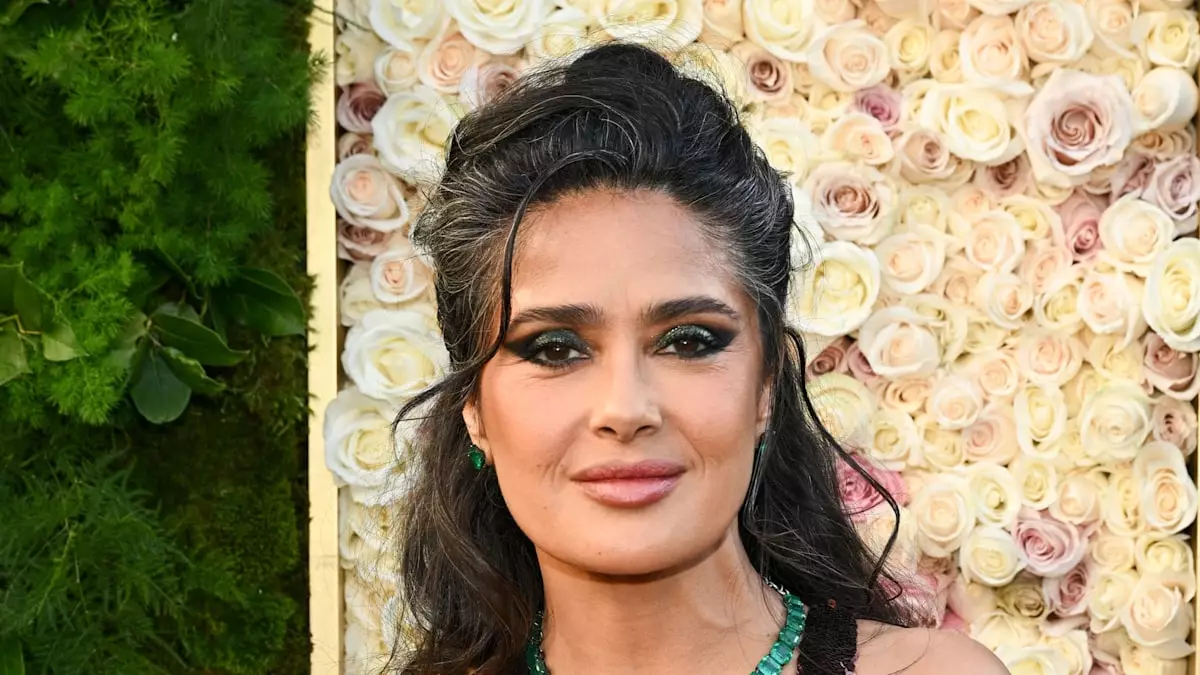Salma Hayek, an enduring figure in Hollywood since her breakthrough role in *Desperado*, has never shied away from the complexities of beauty, aging, and the disconcerting social standards placed upon women. Often dubbed a “sex symbol,” Hayek has skillfully leveraged her position to advocate for the body positivity movement. In a world where society often perceives women’s worth as tied to their physical appearance, Hayek stands as a counter-narrative, demonstrating that grace and wisdom can accompany the aging process.
Her recent interview with *Marie Claire* serves as both a personal reflection and broader societal commentary. The actress admits there’s a transition from youthful exuberance to mature acceptance—a transition she celebrates yet navigates with an honest lens. By calling herself “content” rather than “thrilled,” she outlines an essential truth about self-acceptance: it is not about perpetual delight but about finding peace with oneself over time. Hayek’s candid acknowledgment of longing for her younger body further humanizes her; the sentiment resonates deeply in a culture that incessantly glorifies youth.
Breaking Free from Conventional Standards
What is most compelling about Hayek’s stance is her commitment to reshaping the narrative around aging and femininity in the film industry. “Thank God age came,” she remarked, expressing relief that this natural process allowed her to dive into new territories of artistry and self-expression. Here, she underscores a vital point—growing older should not equate to diminishing desirability or worth. Instead, aging can empower women to explore their full potential across diverse dimensions, thus breaking down ageist stereotypes prevalent in Hollywood.
The actress’s reluctance towards traditional fitness regimes further emphasizes the need to redefine wellness. Rather than adhering strictly to gym culture, she favors a balanced approach that emphasizes listening to her body’s needs. This perspective becomes empowering, advocating for a relationship with one’s body based on understanding and compassion rather than criticism. In a society obsessed with gym memberships and intense workout sessions, Hayek’s preference for joyful movement and moderation is invigorating.
A Reflection on Self-Connection
Hayek champions meditation as a tool for fostering a deeper connection with one’s body, encouraging women to step away from external validation and tune into their own physical and emotional states. “Our only connection to our body is to complain,” she points out. This statement is a profound observation on modern life; many individuals, particularly women, grapple with constant scrutiny over their bodies, leading to a disconnection from what their bodies are actually communicating.
Instead of lamenting her physical changes, Hayek invites women to inhabit their bodies more fully, to engage in a dialogue with themselves that transcends mere surface-level dissatisfaction. Through meditation, she advocates for self-listening—a practice that encourages women to explore their bodies without judgment, thus enhancing their self-awareness and acceptance.
Reconstructing Female Narratives
In her discussion on intimate relationships, Hayek’s insights echo a revolutionary call for women to embrace vulnerability without transactional thinking. She challenges the pervasive notions that often cloud sexual encounters with insecurity and comparison. The call to “explore another human being” suggests a profound journey not only towards understanding another person but also towards self-discovery and appreciation.
In sharing her views, Hayek becomes not just a participant in her own story but a beacon of empowerment for women everywhere. Her rejection of superficial standards and nourishing interpersonal connections indicates a larger, transformative potential for redefining the female experience in various aspects of life.
With an unabashed embrace of her sensuality and a commitment to advocating for women’s rights against ageism, Salma Hayek exemplifies a timeless beauty that transcends societal constraints. Her journey encourages women to celebrate their bodies—both past and present—and to concurrently cultivate a deeper relationship with themselves in a world that often tries to dictate otherwise.

